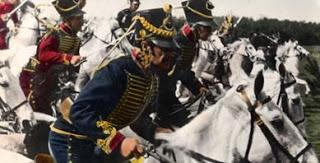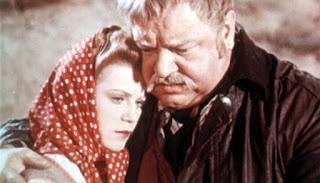
"Death is overcome by victory... It is the greatest thing of all."
Joseph Goebbels often confused cinema and reality, as Kolberg (1945) demonstrates. With eight million Reichsmarks and thousands of Wehrmacht extras, he produced this Napoleonic War epic during the waning days of World War II, hoping it might turn the tide. When Soviet troops captured Kolberg, Goebbels ordered the news suppressed so as not to spoil the film's release. Since few besides Hitler's general staff saw Kolberg, its impact was negligible.It helps to view Kolberg as the Nazi answer to Olivier's Henry V: an historical epic mixing battle scenes and patriotic bombast. One can't easily divorce it from context, yet on its own, Kolberg's no better or worse than most Allied-produced flag-wavers of the same era.
In 1806, Napoleon's troops defeat Prussia, dissolve the Holy Roman Empire and march on the village of Kolberg. Mayor Joachim Nettelbeck (Heinrich George) defies city leaders and advocates resistance. He clashes with cowardly General Loucadou (Paul Wegener), who's let his defenses go to waste. Fortunately, Nettelbeck receives help from August Gneisenau (Horst Caspar), a charismatic young general who organizes the townspeople in defense. Yet Napoleon brings a huge army against Kolberg, and even with Nettelbeck's gallantry surrender seems only a matter of time.
Director Veit Harlan's most remembered for Jud Suss, but Kolberg's a follow-up to The Great King, his sanctimonious Frederick the Great biopic. Kolberg glorifies Nettelbeck as a proletarian defender of the Fatherland, when even Gneisenau wavers. The main note is defiance towards Germany's enemies, hammered in endless speeches about sacrifice and selflessness. Harlan also slams Germany's seditious establishment: the Junkers, businessmen, clergy and simpering General Staff who oppose Nettelbeck, just as they betrayed Hitler. Fortunately, the German volk defy these arrogant traitors.

Besides its curiosity value, Kolberg's worth watching for its spectacle. With full state backing, Harlan marshals resources unparalleled until Sergei Bondarchuk's Soviet epics. The battle scenes involve huge lines of soldiers surging across fields, defying rivers and artillery fire; they're impressive in scope, though not tactically detailed. There are also parades, dances and artillery barrages of a scope rarely seen in that era outside Gone With the Wind. War movie buffs should appreciate Kolberg, even if the Nazi connections turn others away.
Heinrich George makes a fine protagonist, gruff, amiable and plainspoken. Kristina Soderbaum, Harlan's wife, digs trenches and delivers messages behind enemy lines. Horst Caspar gives a charismatic turn as Gneisenau, the younger officer needed to deliver Germany from evil; the Junkers are represented by the bumptious, hammy Paul Wegener. Otto Wernicke (The Testament of Dr. Mabuse) plays a crusty farmer, Gustav Diessl an insubordinate captain.
Kolberg's a definite historical curio. It's impressive in scope and conception, even if the speechmaking grows wearisome. But then no one ever accused the Nazis of subtlety.

